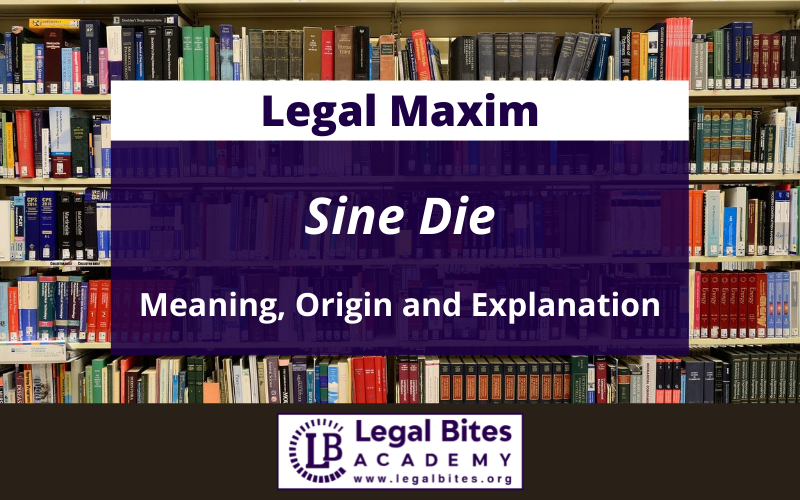This article titled ‘Sine Die: Origin, Meaning and Explanation’ is written by Sahajpreet Bhusari and discusses the concept of sine die. I. Origin and Meaning Sine die is a legal maxim of Latin origin. In Latin, the maxim literally refers to ‘without any fixed future date or for an indefinite period’[1]. II. Explanation Sine die refers to a situation in which there is no set date or time for it to restart. The word is used to describe an adjournment when the date to rejoin is...
This article titled ‘Sine Die: Origin, Meaning and Explanation’ is written by Sahajpreet Bhusari and discusses the concept of sine die.
I. Origin and Meaning
Sine die is a legal maxim of Latin origin. In Latin, the maxim literally refers to ‘without any fixed future date or for an indefinite period’[1].
II. Explanation
Sine die refers to a situation in which there is no set date or time for it to restart. The word is used to describe an adjournment when the date to rejoin is not specified. A legislative body adjourns sine die, or without selecting a day, for the next session or trial.
Such a sine die adjournment has the particular drawback of providing no closure to the dispute; the action simply sits there indefinitely as adjourned. In rare situations, however, a council will postpone sine die but return the case with specific conditions, such as seven days’ notice.
III. Illustration
If a case is started using the incorrect method, the court can order the case to be adjourned sine die (indefinitely) so that the party can pick the proper procedure.
IV. Case Laws
The Gujarat High Court held in Chhabildas Mehta, M.L.A. and Ors. v. The Legislative Assembly, Gujarat State[2] that the Speaker may bring any sitting of the House to an end sine die or postpone to a particular day of the same day to just be named by him without debate or voting: Provided that the Speaker may, if he feels so may call for a sitting of the House well before date and time to something which has been temporarily suspended sine die
The maxim was considered in Shri. Stevie M. Marak & Ors v. Ghadc & Ors[3], in which the Meghalaya High Court found that “adjourned sine die” in common parliamentary practise indicates that a sitting of the House is adjourned without a clear date for its next sitting being set.
References
[1] Sine Die, Available Here.
[2] (1970) 11 GLR 729.
[3] WP (C) 523 of 2019.
- Law Library: Notes and Study Material for LLB, LLM, Judiciary and Entrance Exams
- Legal Bites Academy – Ultimate Test Prep Destination



